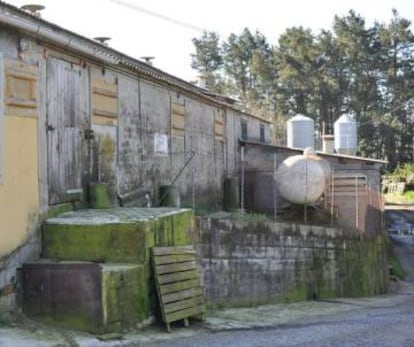Spanish police rescue Colombians kept in slave-like conditions on pig farm
Immigrants worked six days a week while they suffered from diarrhea and vomiting

They lived right above the pigsty. A staircase in the barn led from the squealing animals to their so-called home – a small space consisting of “a mattress with broken springs,” a sofa bed and a kitchenette. They could only use river water, which was “mostly filled with mud.” The smell of the place was nauseating. The roof dripped with humidity. And dead rats were scattered across the floor.
Last Wednesday, Spain’s national police force arrested a businesswoman from Sarria, in the Galician province of Lugo, for keeping three Colombian workers in “inhumane, insanitary” conditions “without any legal rights or assistance.” She is being investigated for human trafficking for the purpose of labor exploitation and abusing the rights of workers. The police painted a hellish scene of what it was like for the Colombians living in complete squalor, amid garbage bags and with a toilet that could not be flushed because the pipes were blocked.
Police believe the three men were “tricked” into coming to Spain by the woman from Lugo and then forced into slave labor. They worked six days a week, 11 hours a day. They could only take a break when she allowed them to. The woman allegedly promised them a proper work contract on her farm and said she would sort out their legal status once they were in Spain. But after booking the plane tickets, hotel and purchasing travel insurance (requisites to enter Spain on a tourist visa), she never organized the paperwork.
Colombians were tricked on the promise of a proper contract and legal immigration status
According to the police, the three immigrants took over the job of “another person” and “began to work straight away” in the rank-smelling pig farm. They had no medical insurance and when they became “sick with vomiting and diarrhea” they received no help and “instead had to continue working.” The only medicine they received for their illnesses was that “which they had brought themselves from Colombia.”
The case is now under investigation by a court in Sarria. Meanwhile, the three Colombians have three months to normalize their legal status, if they still want to stay in Spain.
Ramón Carballo, the government deputy delegate in Lugo, said the police was tipped off by “third parties who communicated that labor exploitation could be taking place at a farm in Sarria.” Carballo said the Colombians are welcome to stay if they can produce a job contract or through family reunification if they have any relatives already living here. Otherwise, they will have to return to their country and apply for residency from there.
Although Carballo insists the situation was an “isolated case,” it is a stark reminder of the human trafficking network that once exploited Moroccan workers on chicken farms in Lugo province. The case was exposed by a police investigation codenamed Operation Chicken in 2008, and it was the first in a series of cases to rock the city of Lugo, implicating hundreds of people, including farmers and immigration officials.
The criminal network, allegedly headed by a Moroccan national named Mohammed Chahidi, brought in an estimated 200 men to work in similar slave-like conditions. The case exploded when a robbery led to the discovery of an overcrowded flat housing the exploited workers. They were being paid just €300 a month after arriving in Spain owing between €8,000 and €15,000 each.
English version by Melissa Kitson.
Tu suscripción se está usando en otro dispositivo
¿Quieres añadir otro usuario a tu suscripción?
Si continúas leyendo en este dispositivo, no se podrá leer en el otro.
FlechaTu suscripción se está usando en otro dispositivo y solo puedes acceder a EL PAÍS desde un dispositivo a la vez.
Si quieres compartir tu cuenta, cambia tu suscripción a la modalidad Premium, así podrás añadir otro usuario. Cada uno accederá con su propia cuenta de email, lo que os permitirá personalizar vuestra experiencia en EL PAÍS.
¿Tienes una suscripción de empresa? Accede aquí para contratar más cuentas.
En el caso de no saber quién está usando tu cuenta, te recomendamos cambiar tu contraseña aquí.
Si decides continuar compartiendo tu cuenta, este mensaje se mostrará en tu dispositivo y en el de la otra persona que está usando tu cuenta de forma indefinida, afectando a tu experiencia de lectura. Puedes consultar aquí los términos y condiciones de la suscripción digital.








































